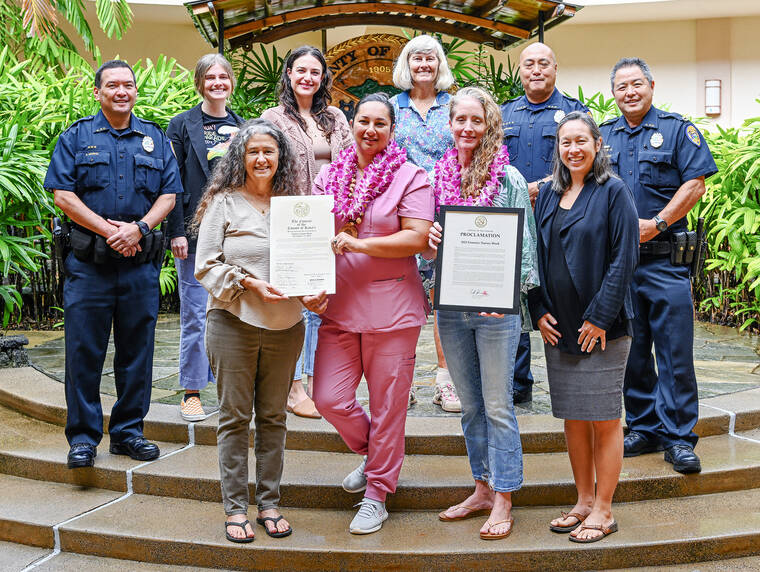LIHU‘E — Chelise Ka‘aihue and Ceisha Judd represent two of Kaua‘i’s five forensic nurses who operate with the Kaua‘i Police Department.
“They are part of the Kaua‘i Police Department’s excellence,” said Felicia Cowden, representing the Kaua‘i County Council, which provided individual certificates of commendation and appreciation to the forensic nurses in celebration of Forensic Nurses Week that started on Nov. 5 and runs through Nov. 11.
Managing Director Reiko Matsuyama, representing Mayor Derek S.K. Kawakami who was occupied with a meeting with the governor on Monday, said forensic nurses, by nature of their jobs, are truly unseen as they care for and tend to victims of violence, including domestic and sexual.
Having to accept these types of commendations and proclamations is one of the few times they come out from behind their working environments, and get to be seen and recognized for their work.
“It takes a special kind of person to be a forensic nurse,” said Kaua‘i Police Department Lt. Anthony Morita. “Forensic nurses deal with people in their darkest moments. They are a beacon of hope for the victims.”
Forensic Nurses Week, started by the International Association of Forensic Nurses and the voice of forensic nurses globally, is designed to recognize the dedicated nurses who provide exceptional care to patients impacted by violence, abuse and trauma.
The IAFN recognizes that violence, including sexual assault, gun violence and human trafficking, is a health care problem, and the IAFN promotes forensic nursing strategies that prevent violence in an attempt to create a world without violence.
The County of Kaua‘i is proud to have a team of five specially trained forensic nurses employed with the Kaua‘i Police Department to serve our community, the mayoral proclamation states.
The forensic nurses at the Kaua‘i Police Department are also part of a Sexual Assault Nurse Examiner, or SANE program which provided a number of ways for a victim of sexual assault to feel safer by allowing them to be treated in a private examination room at the Lihu‘e headquarters.
This allows the patient the ability to be directly in touch with the detectives and nurses who work as a specially trained team for these incidents. It also provides victims with the kind of privacy and confidentiality they would not otherwise receive in a hospital setting.
Communities that promote forensic nursing arm themselves with the vital resources to combat the short- and long-term health consequences of violence and abuse, launch effective prevention efforts and ensure the administration of justice.
Matsuyama supported this by assuring the nurses that there will always be financial support in the budget for forensic nurses.
“We can always use another one,” said acting Assistant Chief Paul Applegate. “We have space for one more forensic nurse and are recruiting to fill that vacancy.”


